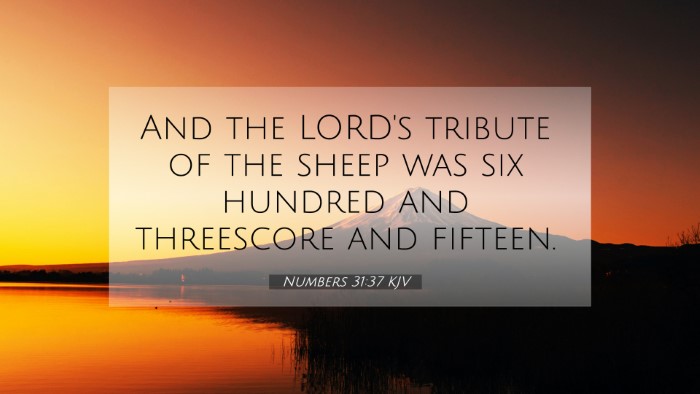Meaning of Numbers 31:37
Verse Context: Numbers 31:37 states, "And the Lord's tribute of the sheep was six hundred and seventy-five." This verse is part of a larger narrative that discusses the aftermath of Israel's victory over the Midianites, where the spoils of war are divided.
Summary and Insights
This verse holds significant weight in understanding the nature of God’s requirements, obedience, and the acknowledgment of His providence in awarding victory.
Matthew Henry's Commentary: Henry emphasizes the importance of acknowledging God's hand in victory and the need for fidelity in fulfilling the obligations that arise from divine interventions. In this passage, the tribute signifies a portion that must be set apart, reflecting a principle of holiness and dedication to God, which applies to every believer's life.
Albert Barnes' Perspective: Barnes interprets this fragment of Numbers as a decisive reminder of accountability. He notes how every action—from the spoils taken in war to the division of the spoils itself—should be performed in a manner that honors God. The specific number of sheep denotes God’s precise instructions and serves to both unify the community and instill a sense of responsibility towards divine ordinances.
Adam Clarke's Interpretation: Clarke suggests that the precise calculation serves as a model for order and structure that God establishes within His covenant community. The tribute functions not merely as a financial obligation but as a representation of spiritual stewardship, reflecting both God's omniscience and His design for a governed society where elements of justice prevail.
Cross-References and Thematic Connections
- Exodus 30:13-15: Discusses the census and the half shekel tribute, establishing a relationship between God’s service and the provision He makes for His people.
- Leviticus 27:30: Relates to the holy contributions; emphasizes God's claim over human resources and the idea of devotedness to God.
- 1 Samuel 15:21: Highlights the obedience to God's commands, paralleling the consequences of failing to acknowledge His authority.
- Numbers 31:28: Also discusses the distribution of spoils, which reinforces the importance of systematic division as a religious and civil duty.
- Deuteronomy 12:6: Regulations on offerings also connect to the theme of offerings and spoils, reinforcing a recurring biblical theme of dedication to God.
- Joshua 6:19: Discusses the devoted things in the account of Jericho’s fall, illustrating God's claim over the spoils of victory.
- Psalm 126:3: Reflects on God’s past deliverance and blessings, echoing the sentiments of gratitude present in Numbers 31.
- Isaiah 26:12: Speaks of God's role as a provider, tying our response of dedication and ultimate dependence back to His provisions.
- Revelation 21:24: Introduces the theme of the nations bringing glory and honor to God, linking back to previous tributes demanded in the Old Testament.
- Romans 12:1: Calls believers to present their bodies as living sacrifices, a parallel to the idea of offering portions of one’s resources and life to God.
Thematic Bible Verse Connections
This verse highlights broader themes such as:
- The principle of divine ownership over our possessions.
- The act of worship through obedience.
- Community responsibility in honoring God’s commandments.
- The significance of structured offerings in both Old and New Testament contexts.
- The call for believers to recognize God’s providence in their successes.
Conclusion
Numbers 31:37 may appear to be a simple numerical record; however, through comparative Bible verse analysis, we unveil layers of meaning, underscoring the themes of obedience, dedication, and divine providence. Understanding the connections between this verse and other scriptural references enriches our study and enhances our appreciation for the Holy Scriptures.


